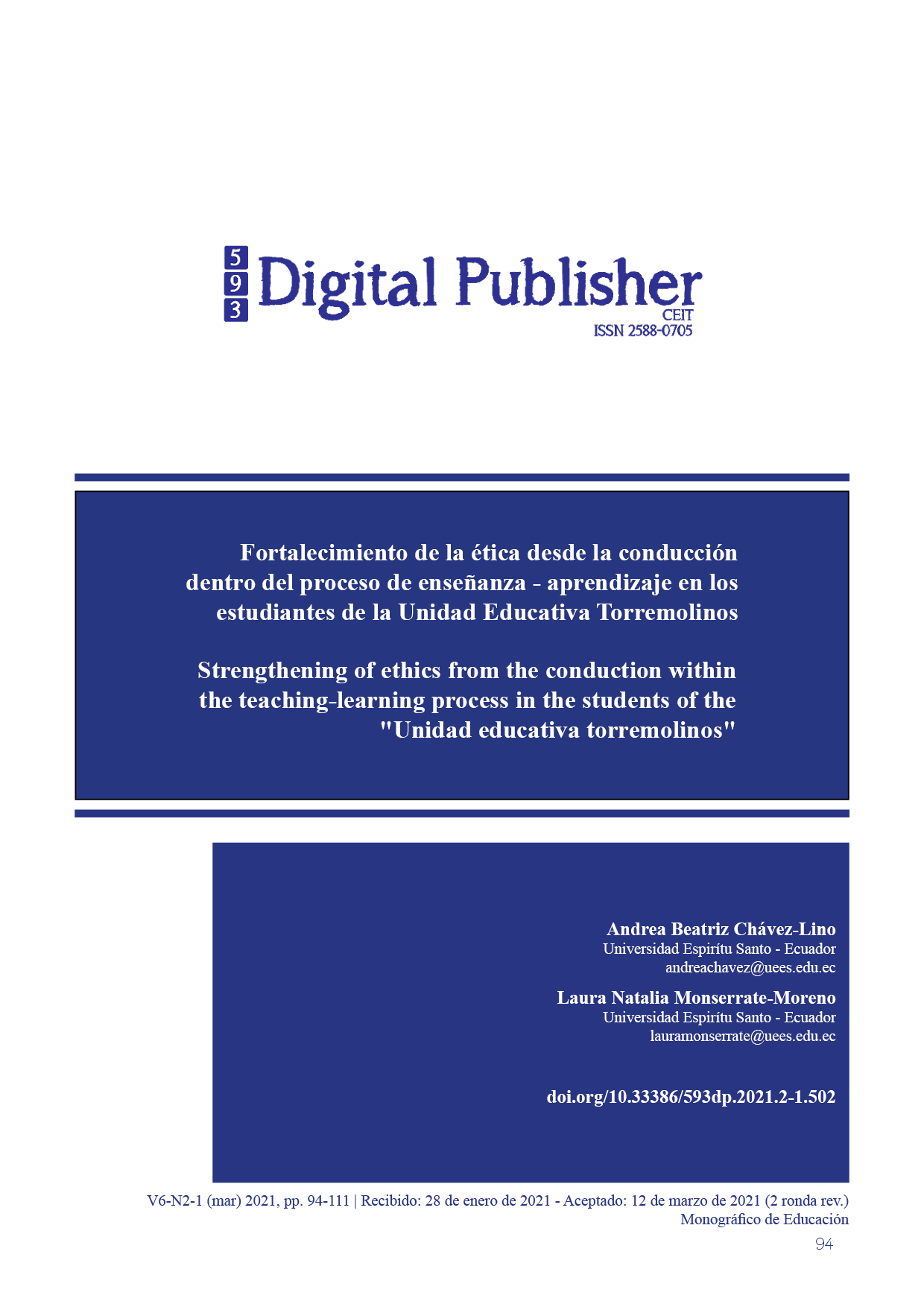Strengthening of ethics from the conduction within the teaching-learning process in the students of the "Unidad educativa torremolinos"
Main Article Content
Abstract
This research addresses a reflection on the importance of ethics in the field of education. We intend to carry out an analysis of ethics based on critical thinking, without forgetting the social situations and the lack of values that our society currently presents.
Said work is aimed at the conduction of the teaching-learning process of the students of the Torremolinos Educational Unit, assuming as essential research variables the direction of ethics and the affirmation of its strengthening as an independent variable.
We propose as a general objective, analyze the strengthening of ethics from the conduction of the teaching - learning process, through a methodological guide, used as a didactic tool, which explains the process to teach, stimulate, motivate students to develop their academic activities with ethics, values and moral principles, this being a pillar of quality within the pedagogical recovery.
The strengthening of self-esteem and self-realization as a human being will be given by the habit of ethical and moral values, serving this in coexistence and decision-making in a globalized world, with double standards, and disrespect at the social level.
The research assumes a mixed approach, where quantitative and qualitative methods prevail, both of which allowed us to solve a problem and produce knowledge in the scientific field. The objectivity that the quantitative approach guarantees us, is reflected in the research line through a methodological guide; that will help us to validate the hypothesis of the contribution of ethics in the teaching-learning process.
Scientific methods such as: hypothetical-deductive, analytical-synthetic, historical-logical and historical comparative stand out; that allowed us to gain new knowledge. Ultimately, the conduction of the teaching-learning process, focused on ethics, causes a favorable impact on student performance.
Downloads
Article Details

This work is licensed under a Creative Commons Attribution-NonCommercial-ShareAlike 4.0 International License.
1. Derechos de autor
Las obras que se publican en 593 Digital Publisher CEIT están sujetas a los siguientes términos:
1.1. 593 Digital Publisher CEIT, conserva los derechos patrimoniales (copyright) de las obras publicadas, favorece y permite la reutilización de las mismas bajo la licencia Licencia Creative Commons 4.0 de Reconocimiento-NoComercial-CompartirIgual 4.0, por lo cual se pueden copiar, usar, difundir, transmitir y exponer públicamente, siempre que:
1.1.a. Se cite la autoría y fuente original de su publicación (revista, editorial, URL).
1.1.b. No se usen para fines comerciales u onerosos.
1.1.c. Se mencione la existencia y especificaciones de esta licencia de uso.
References
AACSB, I. (2016). AACSB, INTERNATIONAL . Obtenido de aacsb.edu: https://www.aacsb.edu/accreditation/standards
Academia. (15 de Julio de 2017). Academia.edu. Obtenido de Academia.edu: https://www.academia.edu/34748349/Etica_y_Aprendizaje
Académica, A. (2017). aacademica.org. Obtenido de aacademica.org: https://www.aacademica.org/alfreserrcas/2
Adriana, S. (3 de Septiembre de 2019). Concepto definición de educación. Obtenido de Concepto definición de educación.: www.conceptodefinicion.de/educación/
Bruce Maxwell; Marina Schwimmer. (2016). Professional ethics education for future teachers: A narrative review of the scholarly writings. ResearchGate.
Canaan, L. R. (2020). Lifeder.com. Obtenido de Lifeder.com: https://www.lifeder.com/tipos-metodos-de-investigacion/
Cano, M. d. (2015). Ética social, profesional, profesoral y de la ciencia. . Scielo.
Don Olcott; Xavier Carrera; Eliana Gallardo; Juan González . (2015). Ética y Educación en la era digital: perspectivas globales y estrategias para la transformación local en Cataluña. RUSC Universities & Knowledge Society Journal.
Educación., M. d. (2018). Filosofía 1BGU. Quito, Ecuador: Don Bosco.
Estela Mari Santos; Arnaldo Nogaro. (2019). Ética, neuroética y prácticas de enseñanza. SciELO.
Fischbach, S. (2015). Ethical Efficacy as a Measure of Training Effectiveness: An Application of the Graphic Novel Case Method Versus Traditional Written Case Study. Springer Link. Obtenido de Springer Link : https://link.springer.com/article/10.1007/s10551-014-2118-7
Gluchmanova, M. (2015). The Importance of Ethics in the Teaching Profession. ScienceDirect.
Ignacio García Hernández, Graciela de la Cruz Blanco. (2015). Las guías didácticas: Recursos necesarios para el aprendizaje autónomo. SciELO.
Indartono, S. (2020). Data on higher education student ethics model. ScienceDirect.
Juliana Toro; María del P. Rodríguez. (2017). Formación en ética en las organizaciones. Scielo.
Leonardo Amaya; Andrés Pérez . (2017). Retos contemporáneos a la ética en el proceso de la publicación científica. SciELO.
MSc María Belén Salazar Raymond, MSc María de Fátima Icaza Guevara, Dr Oscar José Alejo Machado. (2018). La importancia de la ética en la investigación. SciELO.
Pablo Carrasco Guerrero, Alfonso Alcocer Maldonado, Rutilio López Barbosa. (2017). La ética: Una necesidad en las actores de procesos enseñanza - aprendizaje. Index.
Psicologiaymente.net. (16 de Mayo de 2017). Red Educativa Mundial. Obtenido de REM: https://www.redem.org/los-18-tipos-de-educacion-clasificacion-y-caracteristicas/
Rodríguez, H. (2016). La importancia de la ética en la educación. Revista Educativa Moroveña .
WWW.UCM.ES. (2016). Obtenido de Universidad complutense de Madrid : https://www.ucm.es/data/cont/docs/107-2017-02-08-El%20Método%20Cient%C3%ADfico%20I.pdf



